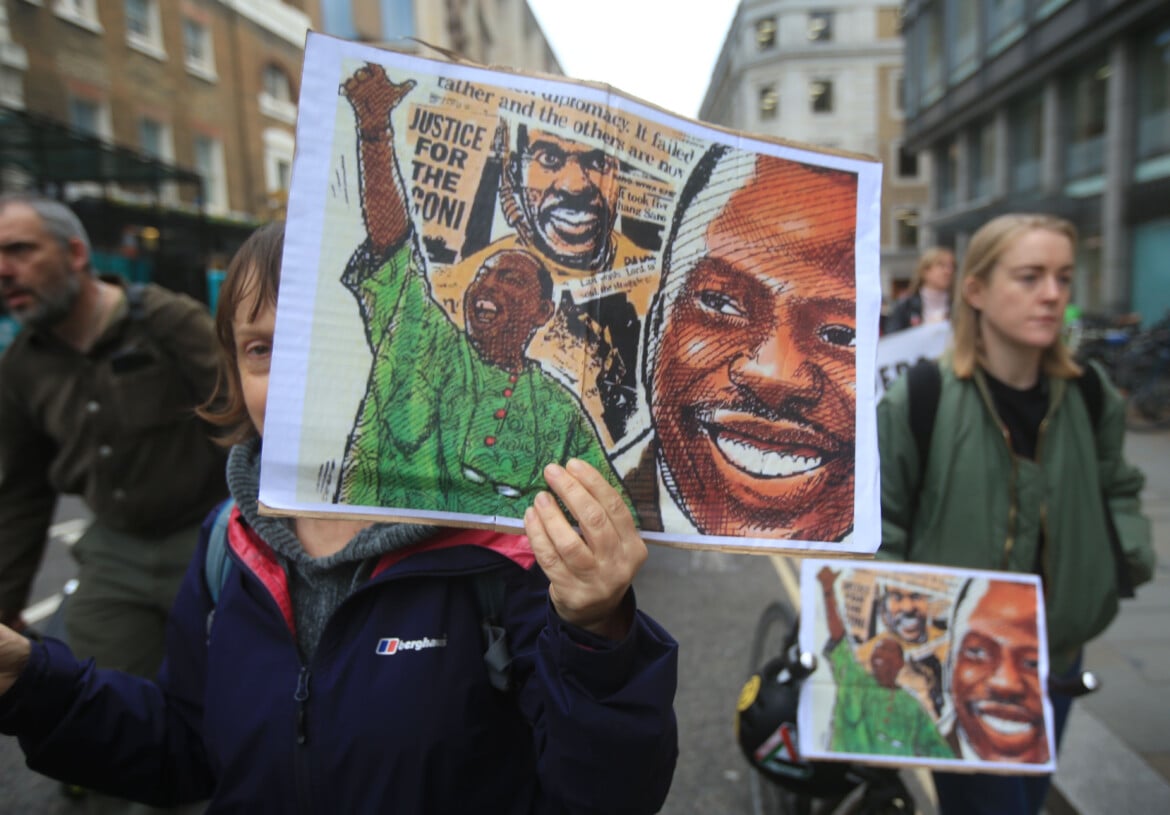Analysis
Ken Saro-Wiwa pardoned posthumously but oil still scars Nigeria’s lands and communities
In the mid-1990s Saro-Wiwa and MOSOP denounced the military junta for failing to enforce regulations on oil companies. They were given a summary trial, then rushed to the gallows.

“This is it – they are going to arrest us all and execute us. All for Shell.”
With those words, Ken Saro-Wiwa, Nigerian writer, environmental activist, and advocate for the rights of the Ogoni people, foretold his fate. Now, 30 years after he and eight comrades from the Movement for the Survival of the Ogoni People (MOSOP) were hanged on November 10, 1995, Nigerian President Bola Tinubu has announced a posthumous pardon.
Kenule Beeson Saro-Wiwa, known as Ken, was the foremost voice of Ogoni culture and among the most influential intellectuals of post-colonial Africa. Born in Dahomey, in French colonial Africa, now the Republic of Benin, he was a writer and playwright, poet and activist, civil servant and publisher. In the 1980s and 1990s, he became a nonviolent champion of the Ogoni people's struggle for self-determination, with a particular focus on stopping the destruction of the ecosystem in the vast Niger Delta, a 70,000-square-kilometer region of Nigeria also known as Oil Rivers because, before the arrival of multinational oil companies, palm oil was produced there.
That battle has so far proved futile: the delta now pumps more than two million barrels of crude each day. All the world’s largest oil companies have profited, and are now selling their onshore assets to focus on offshore gas after decades of poisoning the land and water and uprooting whole communities.
President Tinubu, speaking to the National Assembly on Thursday, June 12, not only announced the pardon but also bestowed on Saro-Wiwa and the eight others the rank of Commander of the Order of Niger, one of the country’s highest honors.
In the mid-1990s Saro-Wiwa and MOSOP openly and publicly denounced the military junta of General Sani Abacha for failing to enforce regulations on oil companies and ignoring environmental law. They were given a summary trial in a military court, then rushed to the gallows in a Port Harcourt barracks.
Ken Saro Wiwa's family said they were pleased with the presidential decision, according to a statement signed by his daughter Noo Saro-Wiwa, a British-Nigerian writer: “We want to believe that the conferment of these national honors symbolizes the innocence of these heroes and further reinforces the global view that the sentence handed down almost 30 years ago was wrong and their execution is considered to be judicial murder.”
Noo Saro-Wiwa then reiterated the accusations against Shell for the “environmental devastation” wrought in the Niger Delta, noting that the Danish company only began divesting its on-shore assets there in 2024 – 263 oil wells, 56 gas wells and 3,173 kilometers of pipelines, valued at roughly $2.4 billion.
In March 2022, a Dutch court dismissed a lawsuit that four widows of the 1995 activists – Saro-Wiwa’s widow among them – had brought against Shell: the Danish company was accused of forging documents and bribing witnesses to escape liability for pollution and corruption. The company had already paid $15.5 million to a group of activist families, including Saro Wiwa’s family, in a 2009 settlement, while continuing to deny all responsibility.
Calling for “a review of the judicial process that led to this flawed verdict, which caused such a colossal loss to our family, to the Ogoni people and to Nigerians,” Noo Saro-Wiwa said the presidential pardon was “the right thing to do.”
But not everyone applauded President Tinubu’s move. “You cannot pardon someone who has not committed any crime: we demand full acquittal,” insisted Celestine Akpobari, coordinator of the Ogoni Solidarity Forum, while veteran environmentalist Nnimmo Bassey, head of the Health of Mother Earth Foundation, warned: “Ken Saro-Wiwa and the others deserve to be honored, but at a time when the government is desperate and wants to boost oil output, while pollution goes on unabated, this decision is out of place.”
Bassey fears that the ongoing reassignment of oil licenses could reopen wells in Ogoniland, “a move that would mean dancing on the graves” of activists like Saro-Wiwa: “Exoneration is the political action we are demanding from the government, to end the environmental genocide and other crimes committed against the Ogoni people.”
These are concrete fears: Nigeria, Africa’s most populous nation, still earns more than 90 percent of its export revenue and about two-thirds of state income from oil. The economy remains dangerously dependent on hydrocarbons, which, while they have the advantage of bringing in foreign currency, have the disadvantage of tying up that foreign currency in the budget to clean up a vast poisoned territory.
The devastation of the Niger Delta, caused by oil and related activities, including oil theft from pipelines which causes continuous spills, has been linked to oil companies by studies conducted by the United Nations, non-governmental organizations and numerous journalistic investigations – as has the unequal distribution of oil revenues, which has caused, and continues to cause, clashes between local populations and political wars.
The Ogoni are not alone in claiming their rights: the Ogale and the Bille peoples managed to bring a case against Shell last year in London’s High Court, and, more broadly, the Niger Delta hosts one quarter of Nigeria’s population: some 56 million people living in a scarred, dangerous territory that has never been reclaimed. A territory that, like the memory of Ken Saro-Wiwa, ought to stand as a warning to humanity.
Originally published at https://ilmanifesto.it/ken-saro-wiwa-graziato-ma-morto on 2025-07-06
